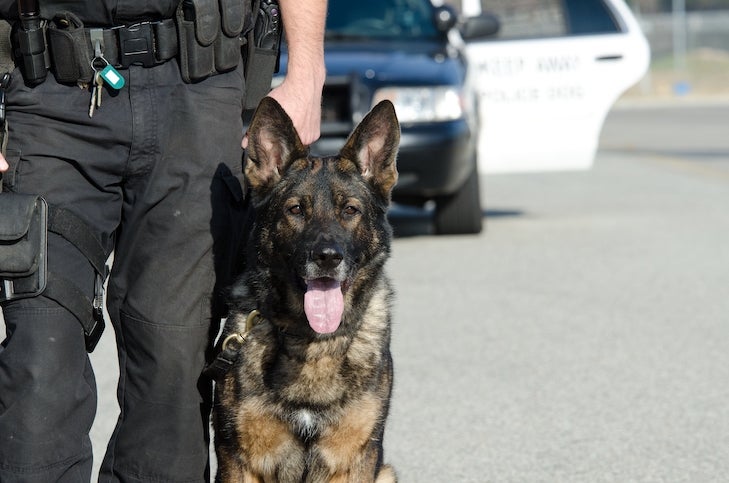
We’re facing a national security issue: there aren’t enough working dogs.
As the need for explosives detection dogs skyrockets, the U.S. struggles to keep up, producing only 7 percent of U.S. government dogs domestically. New research backs our suggested solution: breed more working dogs locally by overcoming the current barriers.
New Research on U.S.-Bred Working Dogs
A recent report from the Graduate School of Defense Management at the Naval Postgraduate School revealed the importance of working dogs within the U.S. Department of Defense and other federal agencies. The report backs concerns previously raised by the AKC Detection Dog Task Force about over-reliance on foreign-sourced dogs being placed as government working dogs (GWD). It also contains an in-depth analysis of the GWD industry and provides recommendations to improve the sourcing of U.S.-bred and trained dogs, including working more closely with the AKC and other stakeholders.
Sponsored by the Acquisition Research Program at the Naval Post Graduate School, this report is the first comprehensive government analysis of the GWD industry in 15 years and explores the disconnect between the demand for working dogs and domestic supply.
Research Findings
The authors, Capt. Jason Passarella (USAF) and 1st LT. Robert Ocampo (USAF) conducted in-depth interviews, industry assessments, and accessed Department of Defense and Department of Homeland Security data on the purchase of working dogs. They concluded that dogs are purchased domestically and overseas by a variety of government agencies using an opaque and inconsistent variety of contracts, agreements, purchase cards, and other contracting vehicles, not all of which are identified within the Federal Procurement Data System.
In line with AKC’s concerns, they found that the shortage of domestically produced working dogs is due to a lack of consistency in sourcing standards and a lack of communication and transparency with providers regarding pricing and requirements.
Other contributing factors include:
- the economics of importing vs. domestic production
- the challenges faced by domestic dog breeders and trainers in doing business with the government
- cultural factors
- forces influencing decisions by potential suppliers to participate in government contracts

The Solution
Based on all the data acquired, the researchers came up with ideas for the Air Force Installation Contracting team to improve the management of the working dog supply chain. This included the establishment of a GWD acquisition communications and marketing plan.
They believe the key is to gain public awareness of the GWD programs by improving relationships between the government and breeder-trainers through new resources to encourage participation in these programs. This includes better information and availability to help potential suppliers become successful in their role.
Their marketing recommendations include exposure through print and digital media and attending industry events, such as the AKC Detection Dog Task Force conference. They also noted that that GWD programs would benefit by attending AKC-lead events, AKC sporting invitationals, and providing interviews to canine magazines such as AKC Gazette.
Other suggestions they included are in line with concerns the AKC Dog Detection Dog Task Force has previously addressed. This includes improving inconsistencies in contractual agreements to help small businesses navigate the government contracting process, understanding the influence of working dog culture overseas, and expanding regional selection sites across the U.S. instead of relying on a single location (currently Lackland Air Force Base).
These latest findings offer a clearer view of these markets, and the importance of having a reliable source of domestically- bred government working dogs.
Currently, 93% of working dogs across all U.S. government agencies are imported from European markets, and the need for dogs has steadily increased to address security vulnerabilities. This research can be a catalyst for the U.S. government to work more closely with the AKC to achieve this change.

